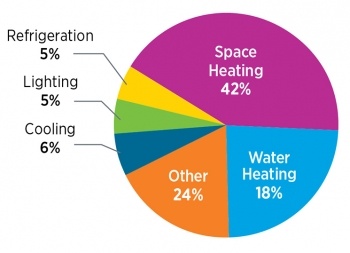10 Water Heater Tips: How to Save Money and Energy
Enjoy reading the latest DIY articles and saving money?
Receive our latest helpful hints, tricks and savings, directly to your inbox.
Posted June 1, 2017
Want to save money on your water heating bill? Water heaters account for about 18% of your total energy bill. Learn how to create a more efficient home.Having hot water in our home is something that most of us take for granted. But if it was ever taken away from us, we would quite literally feel the chill. Hot showers, clean dishes, clean clothes and other creature comforts associated with hot water are intrinsic to our everyday lives. But did you know that hot water is the second largest energy expense in the home? It generally accounts for about 18% of the utility bill (U.S. DOE).
Source: energy.gov
Since hot water is such an essential component in our day-to-day, these facts aren’t necessarily surprising. However, they do suggest that reevaluating usage and maintenance might save the average home quite a bit of money. That leaky faucet might seem inconsequential, but it can lead to gallons of wasted water – and put a substantial “drain” on your monthly bill.
10 Water Heater Tips:
Below are several money-saving water heating tips (many supported by energy.gov) that will definitely help lower those large water heating bill.
1. LOWER THE THERMOSTAT
Though many manufacturers set their water heater thermostats at 140°F, most typical households are comfortable with 120°F. Try taking a shower after you’ve made the adjustment; it’s unlikely you will notice a substantial difference in the temperature. Not only does this small decrease cut costs, it also reduces scalding and slows mineral buildup and corrosion in your heater and pipes.
2. INSULATE TANK
Insulating your storage tank (whether it’s electric, natural gas or oil) helps to reduce heat loss and prevents the unit from turning on as frequently. Be careful to follow the manufacturer’s recommendations which include not covering the heater’s thermostat, burner, and the top and bottom. Call your local plumber for assistance in insulating your hot water tank.
3. INSTALL HEAT TRAPS
Heat traps allow the flow of cold water into the tank, but prevent heated water and unwanted convection to flow from the unit. Most modern water heaters are designed with built-in heat traps. But if your unit is more than 10 years old (and in good condition), installing a heat trap is a viable option. Ask your professional plumber for more information.
4. USE COLD WATER
While this may seem like an obvious tip, using cold water for most laundry loads (especially during the rinse cycle) and for basic grooming (brushing teeth, washing hands, etc.) will go a long way in helping cut down your utility bill. Cold water is also healthy and good for your health and wellbeing.
5. REPAIR LEAKY FAUCETS
A leaky faucet may seem like a minor nuisance, but it can waste water and money in a very short period of time. Repair any leaky faucet immediately (be sure to check the outdoor faucets as well). Did you know that 10% of homes have plumbing leaks that waste over 90 gallons a day (epa.gov)!
Learn how to locate your main water valve and inspect for leaks.
Discover more about fixing pipe leaks.
6. DRAIN THE TANK
It’s a good practice to drain your water heater every year or so. Draining the tank helps to remove sediment that can impede heat transfer and ultimately lower the efficiency of the unit. While this is a relatively easy procedure, always make sure to follow the manufacturer’s directions. If in doubt, call a professional to help with water heater maintenance.
7. INSTALL A TIMER
A traditional water heater tank is always running, which is a waste of electricity. Installing a timer to turn off your heater at night is a great way to help conserve energy – and could add years to the life of the unit. Call your local plumber for more information on water heater timers.
8. INSULATE PIPES
In addition to insulating the tank itself, consider adding insulation to the first 6 feet of both the hot and cold water pipes connected to the unit. This will prevent fire hazards and help conserve heat so that your system doesn’t have to work so hard to reheat it.
9. REPLACE OLD APPLIANCES
If your dishwasher or washing machine is more than 10 years old, you might consider replacing it with a new, more energy-efficient model. There are many new designs on the market (including ENERGY STAR® models) that use less water and are much more efficient than what was on the market even a decade ago.
10. CONSIDER PURCHASING A NEW WATER HEATER
It’s a good idea to replace your water heater if it is more than 10 years old. An old water heater is not only inefficient but could also cause irreparable damage if it leaks or bursts.
When Should I Replace My Water Heater?
If you are thinking about replacing your water heater, there are many different options available to you, including tankless water heating. By only heating water when you require it, tankless water heater can save you $70-$80 per year, which adds up over its 20+ year lifespan.
This water heater infographic by the U.S. Dept. of Energy lays out everything you need to know about your water heater replacement options, along with some tips for lowering your water heating costs:
Source: energy.gov
Don’t continue to throw money down the drain with expensive water heating bills. Follow these tips and conserve both water and energy – while keeping your utility bills in check.
Learn more about protecting your water heater.
 Daily Promotion
Daily Promotion
0% Interest for 12 Months on Select New Tankless Water Heater
Purchase Select New Tankless Water Heater & Receive 0% Interest for 12 Months. Click below to see financing terms.
Get Promotion

